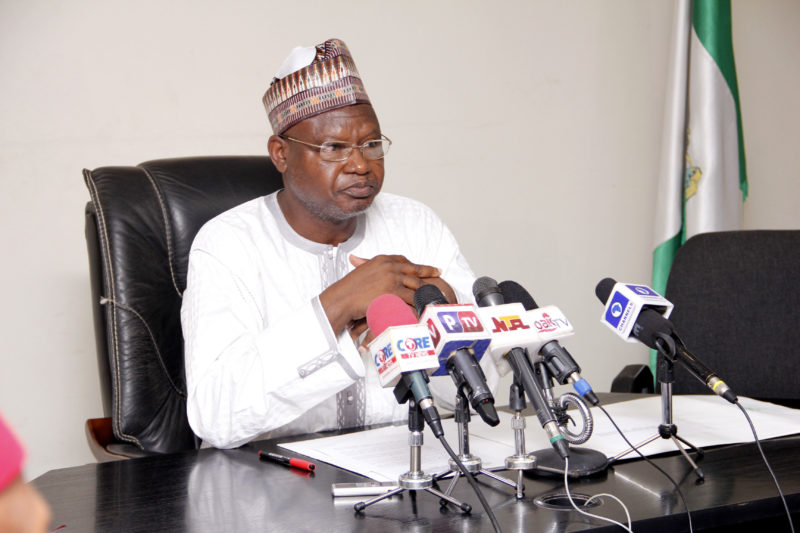Following a series of trials over the years, Nigeria now seems to be getting things right and consequently recording remarkable triumphs in the area of climate change and sustainable development diplomacy.

Ranging from a report submission, the decoration of a financial facility, to the selection of a team of local experts, the accomplishments seem to be emerging in torrents, and the accolades have caught the attention of the authorities.
A source close to the Federal Ministry of Environment disclosed that the minister, Ibrahim Usman Jibril, is positively inclined to the idea of showcasing the nation’s successes in climate change activities. It is not clear precisely how this will be done.
Among others, five activities were isolated as being worthy of note.
Firstly, Nigeria a week ago submitted its First Biennial Update Report (BUR1) under the United Nations Framework Convention on Climate Change (UNFCCC)
“The unwavering decision of the Federal Government of Nigeria to fully comply with commitments to the UNFCCC informed the submission of the country’s First Biennial Update Report (BUR1),” says Jibril.
What has actually been a source of delight to the nation is the fact that the UNFCCC reportedly acclaimed the country’s BUR1 as being “highly qualitative”.
Similarly, Nigeria on Tuesday, March 20 received the 2018 Green Bonds Award under the category of “New Countries Taking Green Bonds Global” at the Annual Green Bonds Conference in London, UK. This followed Nigeria’s issuance of a N150 billion Green Bond to the public.
Nigeria becomes the first nation in Africa to take this step and only the fourth in the world. Nigeria also got a three-star rating in the monthly assessment of 20 countries (including the EU) with high emission levels.
Jibril states: “This further reinforces Nigeria’s re-emergence as a major player in the international climate regime and President Muhammadu Buhari’s strides in moving Nigeria to a low carbon economy.
“Nigeria take pride in being the first African country to issue a Sovereign Green Bond and the forth in the world. The award marks a unique and historic day in the efforts of Nigeria in tackling climate change.”
Also, the Intergovernmental Panel on Climate Change (IPCC) disclosed on Friday, April 6, 2018 that it included seven Nigerians amongst the 721 experts from 90 countries invited to participate in the Sixth Assessment Report (AR6) as authors and editors.
The Nigerians include:
- Hyacinth Nnamchi of the University of Nigeria, Nsukka (Working Group I – Chapter 2: Changing state of the climate system) as Lead Author
- Ms Ibidun Adelekan of the University of Ibadan, Ibadan (Working Group II – Chapter 9: Africa) as Coordinating Lead Author
- Ayansina Ayanlade of the Obafemi Awolowo University, Ile-Ife (Working Group II – Chapter 9: Africa) as Lead Author
- Chukwumerije Okereke of the University of Reading, UK (Working Group III – Chapter 1: Introduction and Framing) as Coordinating Lead Author
- Ms Chioma Daisy Onyige of the University of Port Harcourt, Port Harcourt (Working Group III – Chapter 5: Demand, services and social aspects of mitigation) as Lead Author
- Ogheneruona Diemuodeke of the University of Port Harcourt, Port Harcourt (Working Group III – Chapter 10: Transport) as Lead Author
- Sanusi Mohamed Ohiare of the Rural Electrification Agency (Working Group III – Chapter 15: Investment and finance) as Lead Author
Prof Nasiru Idris of the Nasarawa State University, Keffi said: “The implication for Nigeria is that our input from the Nationally Determined Contributions (NDCs) and some outcome of the results of our scientific researchers on how climate change has impacted on the country will be part of the scientific evidence in the AR6.”
Prof Daniel Gwary of the University of Maiduguri, submits: “This is a good development for Nigeria since the IPCC has maintained the number of Nigerian participants with a slight increase as a sign of appreciating contributions from our scientists and experts. It is also good for Nigeria because this team from Nigeria is a new crop of experts helping to increase our expertise in the IPCC process and global climate change discuss.”
Nigeria is also believed to have gotten approval of its Green Climate Fund (GCF) project – The Acumen Fund ($26 million).
Lastly, the nation will play host to the Green Climate Fund (GCF) / African Development Bank (AfDB) Africa Region Private Sector Meeting.
